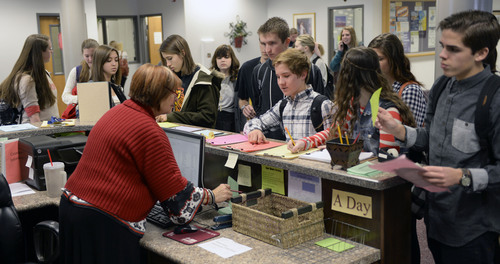This is an archived article that was published on sltrib.com in 2014, and information in the article may be outdated. It is provided only for personal research purposes and may not be reprinted.
Utah's inadequate funding for public education shows up starkly in the number of counselors in junior highs and high schools. Eighty-eight schools do not even meet Utah's rather low standard of one counselor for every 350 secondary-school students.
The national standard is 1 to 250, including elementary schools, but Utah is not the only state where the reality falls far below that ratio.
Utah has the fourth-highest number of students per counselor in the country when grades kindergarten through 12th are included, according to data from the National Center for Education Statistics for 2010-2011, the most recent year for which national data is available.
The best ratio — one counselor for every 200 students — was found in Wyoming, while California had one counselor for every 1,016 students. Utah had one counselor for every 726 students, ranking ahead of only California, Arizona and Minnesota.
For junior highs and high schools, Utah's ratio is about 1 to between 400 and 500 students overall, state administrators estimate. A new state report puts the number at 1 per 349 students in secondary schools. Only two districts have counseling programs for elementary schools.
The need for counselors goes beyond a once-a-year meeting to ensure each student is on track to graduate. Counselors, who must have graduate degrees and experience in academic and social counseling, should have time to monitor all students for signs of emotional and mental-health issues and provide help where it's needed.
Home situations can create attendance and other problems for students, and bullying or isolation from peers can have a devastating effect, particularly in junior high. Counselors could use their expertise to help students find their way through those difficult years and stay in school.
Instead, counselors are used for such activities as overseeing the junior prom or graduation ceremonies because a lack of funding demands they take up all kinds of slack created by too many students and too few educators.
Research shows counseling in elementary school is especially valuable to keep youngsters on track academically and to help prevent behavioral problems from taking root.
Gov. Gary Herbert has earmarked $2 million in his budget to study the need for counselors. It isn't enough, of course, and is further evidence of the governor's underfunded approach to improving education. His priority should be to find new revenue sources for education, not merely to shift around existing money, spreading it ever more thin as school enrollment continues to grow.



